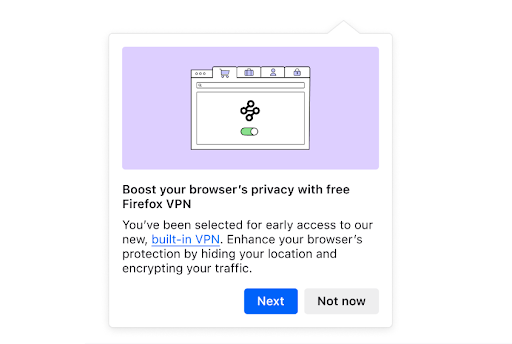- Mozilla just launched Firefox VPN and it’s now in beta
- Firefox VPN is a free browser-exclusive feature built into Firefox
- Mozilla also has its own standalone VPN client, but the two are wildly different
Mozilla has just started testing what it calls a “new experiment”: Firefox VPN.
This is a free browser-only VPN that is built directly into the Firefox browser and is currently available in beta.
The company says it will start simple with a fairly basic VPN service and then evolve the feature based on user feedback.
However, Mozilla has an ambitious goal ahead of it, as the company claims it wants to “build the best VPN-integrated browser on the market.”
Here’s everything we know about Firefox VPN so far, including how it compares to Mozilla VPN and how to join the beta.
What is Mozilla Firefox VPN?
Firefox VPN is a new, free, and browser-exclusive VPN feature built right into Mozilla’s Firefox browser.
It is currently in beta testing and is designed to encrypt and route only traffic that passes through Firefox, rather than protecting the entire device.
In practical terms, it hides your IP address and prevents websites, trackers or network providers from seeing your true location or browsing activity, but only within Firefox itself.
Since Mozilla VPN uses Mullvad servers, Firefox VPN likely does too, although the company doesn’t elaborate on this in its announcement.
Right now, you can only connect to the nearest stable server, so users in the United States will also connect to the US, for example. This means that if you want to watch Netflix from other countries, you’ll still need to use a separate VPN or a different VPN browser extension.
Mozilla says it will only collect some necessary technical data, such as connection status and how much data you’ve used on a given day, and store it for three months. It will not store information about the websites you visited while using Firefox VPN.
How can you join the Firefox VPN beta?

If you want to join the beta, you may need to be patient. Mozilla selects testers at random, so you can enter or not. The only thing you will definitely need is a Mozilla account.
Once it has been selected, you will see a message in the Firefox toolbar. You can then choose to register and log in to your Mozilla account to activate the VPN, or pass up the opportunity by selecting “not now” and then “no, thanks.” Doing this removes the icon from the toolbar.
To activate Firefox VPN, click the VPN icon in your toolbar and activate it. It will automatically select the server closest to you.
There are no usage or bandwidth limits for testers.
What is the difference between Mozilla VPN and Firefox VPN?
Firefox VPN and Mozilla VPN have one thing in common: they both come from the same company. Other than that, they are different products in many ways.
To start, Firefox VPN is free and Mozilla VPN is a paid service. The first is a browser-only tool and the second is a complete VPN client that protects your entire device.
Mozilla VPN offers advanced features like split tunneling, flexible multi-hop connections, and ad blocking, and runs on the WireGuard VPN protocol. Meanwhile, Firefox VPN doesn’t interfere with your connection outside of when you use the browser.
Although Mozilla VPN can’t rival some of the best, like NordVPN, the service continues to evolve. Mozilla recently made its proprietary VPN available to all Linux distributions.
It remains to be seen whether Firefox VPN will evolve into a service capable of competing with the best free VPN options out there. Mozilla is certainly trying and hopes its users will help in this effort.




